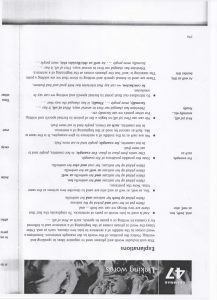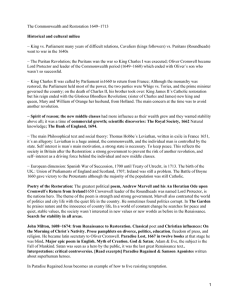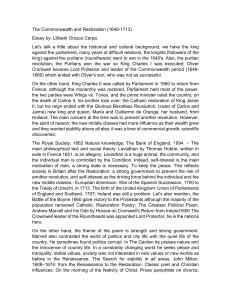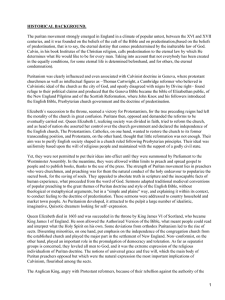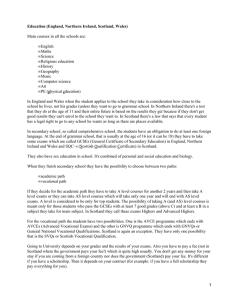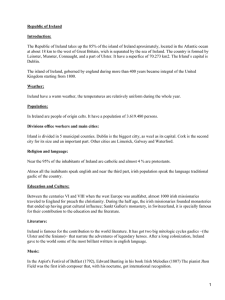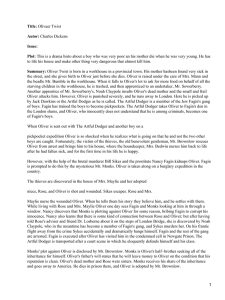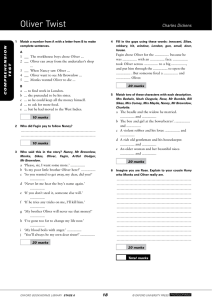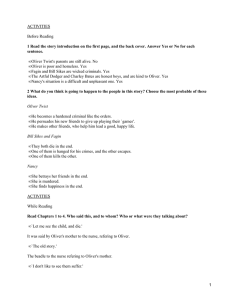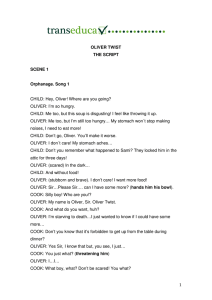Oliver Cromwell
Anuncio
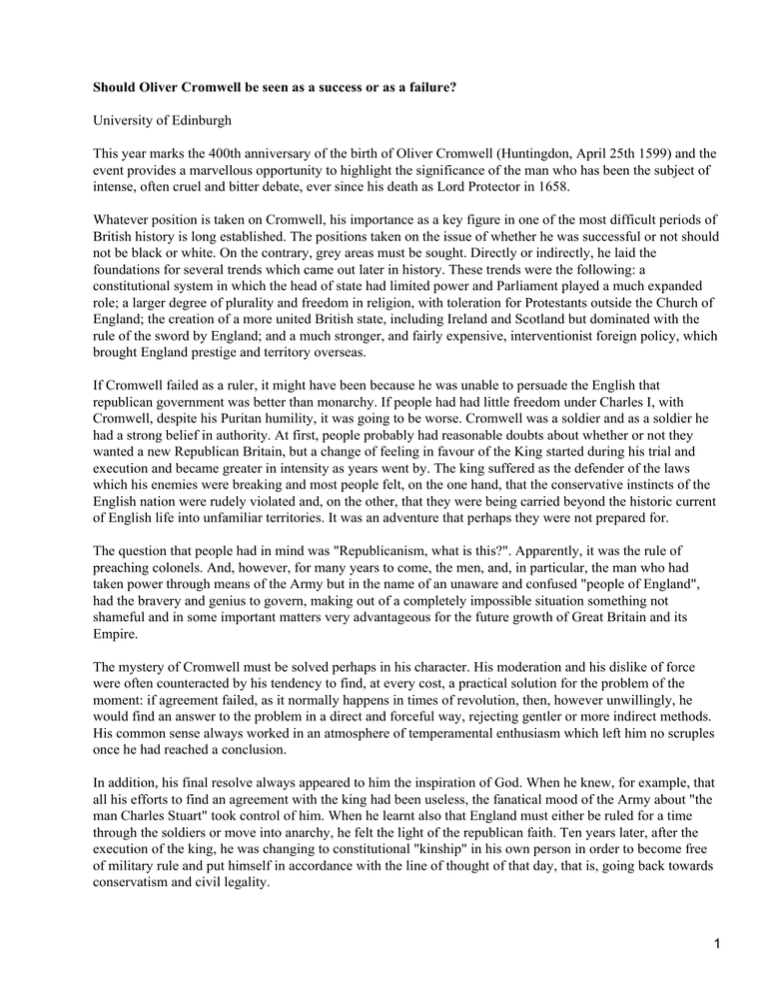
Should Oliver Cromwell be seen as a success or as a failure? University of Edinburgh This year marks the 400th anniversary of the birth of Oliver Cromwell (Huntingdon, April 25th 1599) and the event provides a marvellous opportunity to highlight the significance of the man who has been the subject of intense, often cruel and bitter debate, ever since his death as Lord Protector in 1658. Whatever position is taken on Cromwell, his importance as a key figure in one of the most difficult periods of British history is long established. The positions taken on the issue of whether he was successful or not should not be black or white. On the contrary, grey areas must be sought. Directly or indirectly, he laid the foundations for several trends which came out later in history. These trends were the following: a constitutional system in which the head of state had limited power and Parliament played a much expanded role; a larger degree of plurality and freedom in religion, with toleration for Protestants outside the Church of England; the creation of a more united British state, including Ireland and Scotland but dominated with the rule of the sword by England; and a much stronger, and fairly expensive, interventionist foreign policy, which brought England prestige and territory overseas. If Cromwell failed as a ruler, it might have been because he was unable to persuade the English that republican government was better than monarchy. If people had had little freedom under Charles I, with Cromwell, despite his Puritan humility, it was going to be worse. Cromwell was a soldier and as a soldier he had a strong belief in authority. At first, people probably had reasonable doubts about whether or not they wanted a new Republican Britain, but a change of feeling in favour of the King started during his trial and execution and became greater in intensity as years went by. The king suffered as the defender of the laws which his enemies were breaking and most people felt, on the one hand, that the conservative instincts of the English nation were rudely violated and, on the other, that they were being carried beyond the historic current of English life into unfamiliar territories. It was an adventure that perhaps they were not prepared for. The question that people had in mind was "Republicanism, what is this?". Apparently, it was the rule of preaching colonels. And, however, for many years to come, the men, and, in particular, the man who had taken power through means of the Army but in the name of an unaware and confused "people of England", had the bravery and genius to govern, making out of a completely impossible situation something not shameful and in some important matters very advantageous for the future growth of Great Britain and its Empire. The mystery of Cromwell must be solved perhaps in his character. His moderation and his dislike of force were often counteracted by his tendency to find, at every cost, a practical solution for the problem of the moment: if agreement failed, as it normally happens in times of revolution, then, however unwillingly, he would find an answer to the problem in a direct and forceful way, rejecting gentler or more indirect methods. His common sense always worked in an atmosphere of temperamental enthusiasm which left him no scruples once he had reached a conclusion. In addition, his final resolve always appeared to him the inspiration of God. When he knew, for example, that all his efforts to find an agreement with the king had been useless, the fanatical mood of the Army about "the man Charles Stuart" took control of him. When he learnt also that England must either be ruled for a time through the soldiers or move into anarchy, he felt the light of the republican faith. Ten years later, after the execution of the king, he was changing to constitutional "kinship" in his own person in order to become free of military rule and put himself in accordance with the line of thought of that day, that is, going back towards conservatism and civil legality. 1 The worst part of Cromwell's constructive work within the British island was the land settlement in Ireland. In fact, it is something that has outlived him in the form he gave it. It completed the transference of the soil from Irish to British proprietors (mainly soldiers and people who have provided money for the conquest) and with this, the object was twofold: to keep the English hold upon Ireland safe against another rebellion like that of 1641 and to finish with Catholicism. The second, of course, was not attained and among the reasons why it happened one fact stands out. In Ireland, as Oliver left it and as it long remained, the English almost finished with the people who owned the land and had good social position (the only exception being Ireland west of Shannon). Nevertheless, the Catholic priests, though persecuted, continued to preach and became the only leaders of the people. Thus the Cromwellian settlement made the Irish the most priest−led population in Europe and stiffened the Catholic resistance. Once Ireland had been subjected to the obedience of the Commonwealth, the next task for Cromwell was to reduce Scotland. The situation till then was dominated by the feuds of the Scots among themselves and this fact made their country an easy objective to the purposes of one English government after another. Basically, the long and bitter quarrels were between the Presbyterians, and the Cavaliers, who represented the rebellion of the nobility and others against the rule of the State by the Church. The only time in which both groups forgot their mutual dislike was at Dunbar and Worcester and it was with the intention of restoring Charles II to his throne in England but they were defeated by the English army. Of the foreign governments to come to Scotland, Oliver's was the first and maybe the least bad. Again the dangerous rule of the sword would enable him to take measures and to force the country to obey but for the first time Scotland enjoyed the immense advantage of free trade with England and her market beyond sea. Order was maintained and justice administered without favour. To defend the Highlands, and to keep the clans in awe, soldiers were sent to live in forts and garrisons there. The government was good, but, as in England, it was costly and the taxes were hard to bear and deeply resented. As to the honour and efficiency of the Scottish Presbyterian Church, it was preserved in general terms, while it was no longer permitted to persecute others or to have control over the State. In 1660 the Scots acclaimed the restoration of Charles II since it meant the return of their own national independence. But the restoration implied something else: the end of economic union, the conclusion of the Scottish members of the legislative sitting in Parliament at Westminster, the finish of their traders selling and buying freely in the English market and the Anglican revenge on the Presbyterian religion. One of the meanings of this, then, is that probably it may not be fair to say that Cromwell was the only responsible for all the troubles and suffering of both Scotland and Ireland since his interest there was always encouraged as a part of England herself. To Cromwell and to the Puritan Commonwealth also belongs the credit of the revival of English sea−power and the establishment of the Navy on a basis of permanent efficiency, which every subsequent government, whatever its political character, tried to maintain. Their measures, which combined warlike training with discipline and tactics, transformed the Navy to its modern scope and established England as the great naval power of the world. But Oliver's direct rule failed to bring financial stability and the subsequent popularity from foreign war. His desire to help English traders and colonists and to free them from the Spanish Inquisition led him into war with Spain, which increased the burden of taxation on the country and gravely injured its trade. Oliver's militarism and imperialism became increasingly unpopular because it cost too much and for people it was intolerable to be forced to give a large part of their incomes. Politically speaking, there was no need for such vigorous intervention due to the fact that Spain had already decayed and the balance of power in Europe stood adjusted. Oliver spent his last years in the belief that Parliamentary rule was necessary. He began and he ended his career as a believer in the uses of constitutional kingship. Yet it was his fate and perhaps his fault to ruin the Puritan cause by separating it from both kingship and Parliament. The civil legality which he also had in his thoughts and feelings was also restored once he died and the way was clear. While he was the Protector, 2 nothing seemed to count but the sword and it left in longer retrospect an indelibly bad impression on the people. The Parliaments elected under the Protectorate were not able to agree with him and the alternative he found was government by Major−Generals. Perhaps Cromwell should have risked more to look for agreements with them but the fact is that it did not occur. His last two years were spent in the difficult task of freeing himself from dependence on a fanatical and extremist army by making terms with many moderate and practical men, particularly lawyers, who thought, against the stubbornly Republican army chiefs, that he should wear the crown. It was then that death overtook Cromwell. On English religion Cromwell also left and indelible mark. His victory in the First Civil War made Parliament instead of King the ultimate authority on ecclesiastical questions. His triumph in the Second Civil War prevented the establishment of persecuting Presbyterian orthodoxy and his rule also looked after the Sects in such a careful way that they gave English Puritanism its form and character in the coming period of nonconformity. The variety of English religious thought and practice, tending always to freedom of opinion, historically dates from the Cromwellian epoch. It is, indeed, remarkable how much of Puritan, or at least of strongly Protestant thought and practice survived the political and ecclesiastical fall of the Puritan sects. Family prayer and Bible reading became national custom among the great majority of religious laymen, whether they were Churchmen or Dissenters. Even the Puritan Sunday survived. The anxiety of James I that the English people should continue as always to play games on Sunday afternoon, was calculated to meet with the approval of the most athletic and "sporting" of all nations. Nevertheless, even at the Restoration, when the very name of Puritan was a reproach, when the jails were full with harmless Quakers and Baptists, the Puritan idea of Sunday as a day strictly set aside for rest and religious meditation, continued to have the support of the English people. The good and bad effect of this self−imposed habit of a whole nation is something that still requires investigation in a dispassionate way. The fatal mistake in his ecclesiastical policy was that he did not give Anglicanism a share in the life of the Church. As to the Roman Catholics, they were less molested under the Protectorate than under Presbyterian or Anglican Parliaments though the Mass was still not legally tolerated. Perhaps the great fault of Cromwell, and of the Puritans in general, was that they had the tendency to exclude all who were not Puritan from power and influence in the State. Their tyrannical and disastrous suppression of the theatre and other clumsy attempts to make people good by force were part of the same general error. When the Restoration came, the non−religious part of the community loathed the Puritans and "the rule of the Saints" as, twenty years before, they hate the Laudian clergy. Cromwell, like many great English soldiers, disliked the idea of ruling his countrymen by the sword, and they disliked him for doing it. In his last years he was seeking for a path back to the rule of law, custom and Parliament. But, these three institutions were in England so inextricably connected with the kingly office by centuries of continuous growth and by the inherited association of ideas, that a restoration of the monarchy and the subsequent failure of Cromwell's regime was needed, if the nation were to enjoy its ancient rights again. BIBLIOGRAPHY Yo he manejado A Shortened History of England, de un tal G.M. Trevelyan y otra historia de Longman, pero esos no los cites. Pon los que tu has manejado, y si quieres, algún otro. Un beso. 3 In 1641 Ireland exploded in rebellion against the Protestant English and Scottish settlers. As many as 3,000 people, men, women, and children were killed, most of them in Ulster. In 1649 Cromwell took an army there to punish the Irish for such killings. He captured two towns, Drogheda and Wexford, and his soldiers killed about 6,000 people. This action has since then remained as a powerful symbol of English cruelty to the Irish. William Laud, appointed Archbishop of Canterbury by Charles I. He brought back into the Anglican Church many Catholic practices, which were extremely unpopular. He also summoned influential laymen to answer for their sins before the priesthood. 5 4
